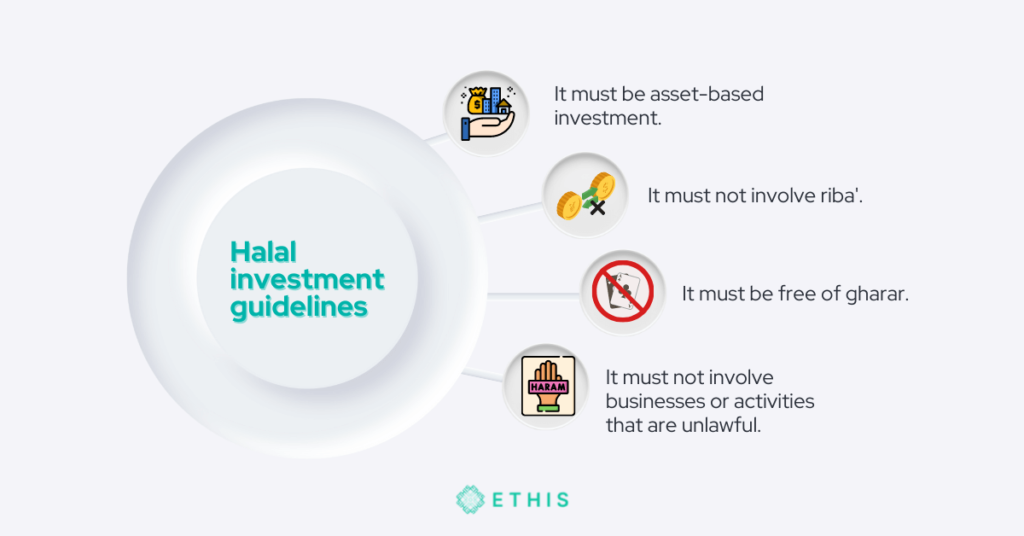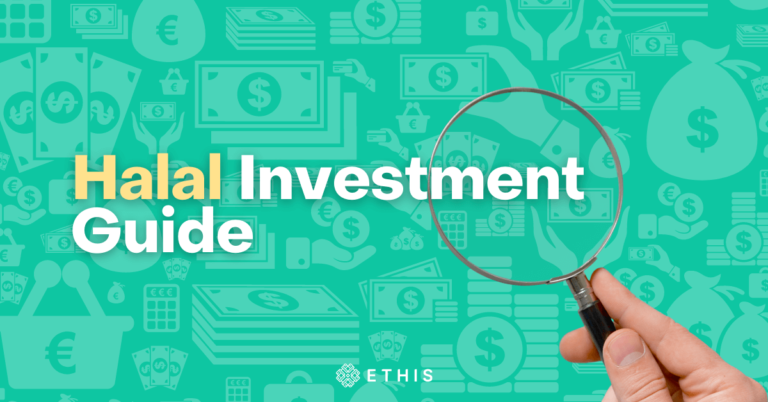
When people talk about halal investment, what is the first thing that comes to your mind? Is it investing in businesses that sell halal food? Or anything that constitutes halal in Islam? What is the halal requirement when it comes to investing by the way? Before we uncover these and more in this beginner’s guide to halal investing, let’s first dissect the meaning behind the terminology.
What is halal?
Halal is an Arabic word that means lawful or permissible. It is any object or action that is lawful and permissible to use, do or engage in according to Islamic law. The opposite of halal is haram, meaning unlawful or prohibited.
The concept of halal and haram applies to all facets of a Muslim’s life including lifestyle, finances, investments, business, and others. This is what makes Islam the way of life as it makes no division between worldly affairs and the spiritual side.
As Muslims, it is our responsibility to align our investment activities with our religious compass. In other words, when we invest our money, we must ensure that the investment we make is halal and shariah-compliant.
Related: Shariah-Compliant Peer-to-Peer (P2P) Lending and Its Risks and Rewards
Halal investment explained
Halal investing is about investing money in accordance with Islamic finance principles. The principles are founded on the application of Islamic law, or shariah, which is derived from the Qur’an and Sunnah i.e. the sayings and practice of the Prophet Muhammad ﷺand his companions. It is a unique form of ethical and socially responsible investment as religious belief is factored into the investment decisions.
Contrary to the secular finance system, which sole aim is to make money, Islamic finance principles place great emphasis on socioeconomic justice, ethics and partnerships that are mutually beneficial. When complied with, it promotes an ethical and just society that is not driven by capitalism and greed.
Here are the key principles of Islamic finance that make up halal investment guidelines.
Halal investment guidelines
Halal investing requires the investor to know all about investment products and how they work. These are fundamental in assessing if the investment is in line with Islamic finance principles as the main principles of halal investment are based on those key principles.
In general, it must be asset-based and should not include riba’, gharar, and non-permissible products and activities. Let’s deep dive into this.


1) Asset-based investment
In Islam, money is viewed as a medium of exchange. It has no intrinsic value in or of itself. Its worth is only measured when it’s exchanged with goods and services that carry intrinsic value.
The use of money for the purpose of making money is prohibited in Islam. Money should not be the subject of investment per se. Investments that are based on money exchange, are, therefore, not permissible. This is related to the prohibition of riba’.
2) It must not involve riba’
Riba’, meaning excess, increase, or addition implies any excess compensation without due consideration. It refers to interest-bearing loans or transactions. Islam has prohibited the excess resulting from interest as it transgresses the Islamic finance principles that promote justice and partnership.
Riba’ al-qard, or loan riba’ for example, distorts the concept of socioeconomic justice as it enables those with capital to be wealthier just by lending money and making money out of it through the interest charged.
This goes against the prohibition of the use of money for the purpose of making money as it is exploitative of the poor who will be saddled with the ever-increasing debt. It also contorts just distribution of wealth and circulation of money to the real economy where goods or services are supposed to be exchanged with money in order for it to be profitable.
Islam also condones dealings that only benefit one party as risks should be shared between involved parties. By forbidding riba’, Islam upholds socioeconomic justice and promotes partnership.



3) Free of gharar
Gharar or uncertainty is derived from the Arabic root word ‘gharra’ meaning ‘to deceive’. It refers to uncertainties in transactions regarding the terms and conditions, price, etc.
Some examples of gharar include contracts that are not drawn out in clear terms, the sale of something that one does not own, such as short-selling, or has yet to be manufactured without an explicitly defined contract from the outset, complex derivatives transactions such as futures, and any forms of speculations (maysir) such as gambling.
Related: Short Selling from an Islamic Perspective
Gharar contradicts the Islamic finance principles that foster fairness, justice, and risk-sharing. The prohibition of gharar protects investors against investments that expose them to a high degree of uncertainties, excessive risks, and one-sided losses. It also prevents investors from future dispute and exploitation where one party gains at the expense of the loss of the other party, such as in gambling.
4) Investment in businesses that sell prohibited goods and/or engage in unlawful activities is strictly prohibited
There are certain matters that are outright unlawful in Islam as they are clearly stated in the Qur’an and Sunnah. Everything that is considered harmful either to the body, mind, soul, or society is prohibited, while whatever is beneficial is permissible.
Among the prohibitions include killing, stealing, oppressing, sex outside of marriage, pork, alcohol, entertainment that contradicts Shariah, and other non-permissible activities.
So naturally, any type of investment that involves these will fall under the unlawful category and must be avoided by Muslim investors.
Is halal investing open to Muslims only?
Though halal investment guidelines serve as a guide for Muslims to ensure their investment activities adhere to the Islamic finance principles, it does not mean the investment options are only restricted to Muslims. Halal investing is open to investors of any faith, especially those who are into ethical investing.


Similar to ethical investing, halal investing strives to support businesses that are ethically run while creating an investment return.
What to look for when deciding on halal investment opportunities?
As with any investment, you must conduct your due diligence before investing in any halal investment vehicles. These are a few questions to consider as a guide.
- What types of products or services that the company sells? Are there any prohibited goods or dealings?
- How is the company run? Are they known for any unethical practices?
- Does the company offer mixed investment options, or operate on both conventional and Islamic practices?
Options that are obviously halal or obviously haram are clear-cut. For businesses that have a cross-over between halal and haram, you may look for fatwa concerning respective investment, if any, for a better understanding but as a general rule of thumb, it should be avoided. This is in accordance with a hadith narrated by An-Numan bin Bashir, the Prophet ﷺ said:
“The lawful is clear and the unlawful is clear, and between that are matters that are doubtful (not clear); many of the people do not know whether it is lawful or unlawful. So whoever leaves it to protect his religion and his honour, then he will be safe, and whoever falls into something from them, then he soon will have fallen into the unlawful. Just like if someone grazes (his animals) around a sanctuary, he would soon wind up in it. Indeed for every king is a sanctuary (pasture), and indeed Allah’s sanctuary is what He made unlawful.” (Jami` at-Tirmidhi)
The bottom line
In sum, halal investing aims to cultivate an ethical and just society. It is founded on the key principles of Islamic finance that promote justice, risk-sharing, and partnership. As the Muslim population continues to grow, so is the demand for halal investments. It’s a growing investment niche that is accessible to both Muslims and non-Muslims alike.
If you are looking to diversify your halal investment portfolio, check out Ethis, the world’s leading Shariah-compliant crowdfunding platform.
Related: Diversify Your Investment Portfolio with Equity Crowdfunding





Top Posts
Islamic P2P Crowdfunding Explained
Halal Money Matters: How Muslims Can Balance Deen and Dunya with Smart Islamic Finance
Halal Investments for Singapore Muslims? It’s time for a shake-up in the Islamic Investments scene.
Smart investment for making Halal money
3 Reasons Why Property Crowdfunding is the Smart Investment for You